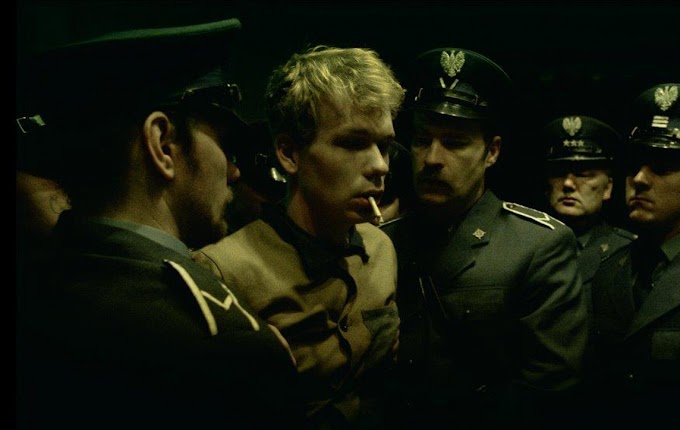Chungking Express, although endowed with a light and optimistic end in itself, remains nonetheless a deeply melancholic film about the difficulty of being alone and loving.

Romanticism
and nostalgia are the two feelings that guide Wong Kar Wai's finest films. The
director illustrates romance only from the angle of melancholy that he likes to
freeze in a fantasized and fetishized past (Days of being wild (1990) and In
the Mood for Love (2000)), revisited genres (Chanbara film in Ashes of Time
(1994), that of kung fu in The Grandmaster (2013)) or even his own imagination
with the fascinating 2046 (2004). When he deigns to film love in its immediacy,
it will result in the feverish Happy Together (1997), which is ultimately
peppered with break-ups and reunions. The feeling of love is most embodied in regret for what was or could have
been for Wong Kar Wai. This idea will be affirmed in a positive way in the most
conceptual, luminous and endearing film of his filmography. With Chungking
Express, this nostalgia for lost love will be healed by the exaltation of the
nascent and hoped-for one. Caught up in the heavy logistics of his Chanbara
film, The Ashes of Time, Wong Kar Wai faces yet another interruption in
filming. Chungking Express thus acts as a recreation with a modest
shooting whose only purpose is to give him the pleasure of filming. As
often he attaches himself to a place with the neighborhood of Lan Kwai Fong in
Hong Kong, theatre of a variation on the same theme with two twin stories: a policeman
in the prey of the grief of love finds the flame thanks to a new
encounter. It will first be the shadow with the unlikely couple consisting
of Takeshi Kaneshiro and Ling Ching Hsia. The aesthetic gives in stylised
fulgurances that captures a bustling and cosmopolitan Hong Kong by following
the shady activities of Ling Ching Hsia. The effects of dilations and
accelerations, the handheld camera and the naturalistic photography of
Christopher Doyle magnify the nocturnal urbanity that Ling Ching Hsia roams.
This contrasts with the ambient realism with its mysterious and iconic presence,
whose finery (blonde wig, dark glasses and large raincoat) mask both the real
appearance and the feelings. Conversely, introspective spleen dominates with
inconsolable Takeshi Kaneshiro. The youthful features, the naive voice-over and
the playful ideas (the challenge of the thirty outdated pineapple cans, his
singular way of falling in love with Ling Ching-hsia) to show his distress
surround him with a very endearing poetic facet. When they finally meet, Wong
Kar Wai plays both the glossy side of Ling Ching Hsia and the candor of
Kaneshiro, the unspoken and jazzy music bringing intimacy and promiscuity.
Tired of running, she can finally drop onto his shoulder. Tired of moping, he
finds a new object of affection. The unity of time makes this brief encounter all
the more fleeting, but when the day dawns everything has changed. By stealthily
exposing her flaws, she can evaporate stripped of her artifices, and she is
invigorated and ready to resume her life.

The second
story gives in a more immediate charm. This time, it’s the newly dropped Tony
Leung Chiu Wai who will see Hurricane Faye Wong tumble into his life. When the
first story played on immediacy and chance for the convergence of an unexpected
encounter, it is the repetitiveness of the situations, of the soundtrack
(California Dreamin 'of The Mamas and the Papas on loop) and of habits that
awaken the feeling of love. Brilliant narrative ideas (Tony Leung's gradual
change of menu hinting at his celibacy) accompanies a staging that once again
makes fun of the candid and the bruised. Wong Kar Wai introduces Faye Wong
almost anonymously before freezing her in a still shot, a way of isolating the
character while expressing her shyness. She observes and takes an interest in
her client's discomfort from a distance, fading under her playful side or
downright in the image. The director multiplies the shots through a window,
from the back of the bar where, while cleaning, she secretly stamps her feet
with love. This big sister of Amélie Poulain can only declare herself secretly,
changing the life of her beloved by intruding into her daily life.

Carried by a
solar actress, Wong Kar Wai plunges us into a charming bliss when Faye Wong
sneaks in on Tony Leung's to arrange his apartment without his knowledge. The
expectation bewitches as much as the hope of the meeting and the declaration,
but in a much warmer light than the painful restraint of In the Mood for Love.
Impossible for the viewer not to fall in love with Faye Wong, dazzling with
freshness and spontaneity - to see her reaction when Tony Leung brings her his
CD, proof that she is unmasked. We hope and fear with her to be noticed, we
have fun with her secret influence, and the jubilation even bathes the
soundtrack which shows her singing talents (her initial profession) during a
beautiful Cantonese cover of Dreams of the Cranberries. The film exudes
youthful ardor and even finds this nostalgic touch so peculiar to Wong Kar Wai
through its elements rooted in the 90s (pagers, voice boxes to consult ...)
while capturing with ideal acuity the Hong Kong of the time (and its unlikely
architecture with Tony Leung's window overlooking an escalator). Once again,
the romance remains chaste and platonic (apart from the flashbacks with the
flight attendant), with the first story playing on memory and the second on
waiting. What could be more painful than a lost passion, what could be more
intoxicating than a hoped-for love? Chungking Express is the great film of
romantic dreamers.

.png)

0 Comments